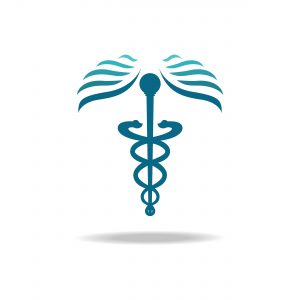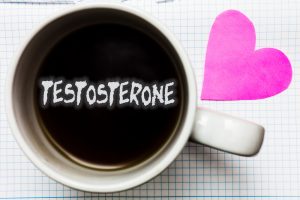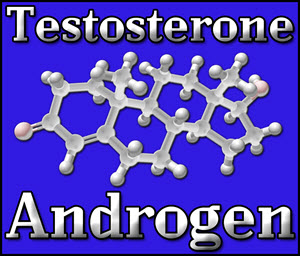Video Link: https://vimeo.com/388577118
Video Download: Click Here To Download Video
Video Stream: Click Here To Stream Video
While it's clear that Testosterone Therapy is highly beneficial for so many men across the world, there is a tremendous and ongoing debate regarding the use of Prescription Testosterone for Aging Men with Low-T.
There have been signals from research that suggest that men taking Testosterone may be more at risk for cardiovascular complications, for example.
There's also  evidence that Testosterone HRT reduces overall mortality risk by mitigating health risks associated with Testosterone Deficiency.
evidence that Testosterone HRT reduces overall mortality risk by mitigating health risks associated with Testosterone Deficiency.
Dr. Christel Renoux is highly experienced in Hormone Replacement Therapy Research.
While she spent her early career studying the effects of HRT Therapy for Women, she now primarily studies Male Hormone Replacement with Testosterone.
She explains that the medical community is split: mainly concerning their beliefs in the overall effectiveness of Testosterone for Health and Longevity.
Some believe that Testosterone Treatments provide significant benefits to patients, while others are cautious and think that there is insufficient evidence to prove that the benefits outweigh the costs.
This conflict is also evident when looking at the way that different countries approach Testosterone Replacement from a safety standpoint.
In the United States and Canada, there are warnings on Testosterone Products to make patients aware of their potential drawbacks. European agencies have found insufficient evidence of risk, however.
Testosterone Risk/Benefit Analysis Ongoing
While it is true that you should weigh the risks and benefits of any medical treatment, you should not consider these warnings to be proof of danger.
Future  research will inevitably increase the pool of patients for whom Testosterone Therapy is recommended, though there will always be some for whom the risk is too high.
research will inevitably increase the pool of patients for whom Testosterone Therapy is recommended, though there will always be some for whom the risk is too high.
There have been ups and downs in the patterns of Testosterone Prescription and use. Since the turn of the century, Testosterone has been increasingly utilized for Low-T, with a massive spike from 2007 to 2016.
On the other hand, during this same period, there was a brief dip in prescriptions around 2013 when new research raising questions about the safety of Testosterone was unveiled. As of 2016, Testosterone alone represents a more than $400 million industry.
While Testosterone use has been highly volatile over the past twenty years, the actual incidence of Low-T has been very stable.
Even though the same number of  men test positive for Hypogonadism, more men are reaching out to physicians and Men's Clinics nationwide to receive treatment.
men test positive for Hypogonadism, more men are reaching out to physicians and Men's Clinics nationwide to receive treatment.
Hormone Replacement Therapy Providers heavily advertise Testosterone Therapy as a means to increase sexual ability, improve energy levels, enhance body composition, and more.
Today, doctors and specialists primarily use their own discretion concerning the prescription of Testosterone Replacement.
The most significant factors that should influence this discretion are the safety and the effectiveness of the treatment for the individual patient. As more clinical data continues to pour in, the use of Testosterone will inevitably become more standardized.
Testosterone Study Collects Data From 15,000+ Patients
A recent study (July 2019) led by Dr. Renoux analyzes data from over 15,000 men with Low-T. Men selected for inclusion were at least 45 years old and did not suffer from Testicular or Hypogonadotropic Disease.
Patients received treatment between 1995 and 2017 and were listed in the United Kingdom Clinical Practice Research Datalink database. Involved patients averaged a little over 60 years old.
The majority of patients referenced in this study either received Low-T Injections (33.6%) or Topical Testosterone (56.8%). Overall, analysis demonstrates that this selection of Testosterone Users experienced a 21% increased incidence of Heart Attack or Stroke.
The results took into account twenty potential confounding variables. Among patients that did not receive Testosterone, 1.9 out of 1,000 experienced one of  these cardiovascular events, whereas 2.4 out of 1,000 Testosterone Therapy Patients had a Stroke or Heart Attack.
these cardiovascular events, whereas 2.4 out of 1,000 Testosterone Therapy Patients had a Stroke or Heart Attack.
Due to the size of this study, researchers were able to break down this increased risk into smaller categories.
They found that odds were at their highest during the first two years of Treatment primarily affecting patients 45-59 years old.
While the risk of these dangerous issues increased slightly as a result of therapy, patients were discovered to have a lower mortality risk as compared to patients that never used Testosterone Therapy.
In fact, the study showed that patients had a 75% lower mortality risk when on Testosterone.
How Could Testosterone Increase Heart Risk While Also Reducing Mortality Risk?
One hypothesis is that patients taking Testosterone have a higher risk of heart attack or stroke, but still experienced improved longevity overall. On the other hand, this could also be influenced by the health status of patients that select Testosterone Therapy in the first place.
Patients that have more significant health issues are much more likely to stop taking Testosterone or never take it in the first place.
Most likely, both of these hypotheses are partially true. The lead researcher concludes that there must be more going on under the surface because such a robust reduction in mortality risk is unbelievably optimistic for patients without a proper explanation.
This is not the first study to demonstrate that Testosterone Therapy appears to reduce mortality risk. Another study published by Bradley Anawalt in 2012  showed a similar pattern among men 40+ that used Testosterone for Low-T.
showed a similar pattern among men 40+ that used Testosterone for Low-T.
He suggests that improved muscle mass and strength helped men avoid death from accidents that involve fractures and broken hips.
He is quick to point out that neither the medical community nor the public should discount the results of these studies out of a bias against Hormone Replacement Therapy.
Seemingly minor advantages can lead to statistically beneficial outcomes.
Should Patients Still Feel Safe With Testosterone?
In the end, both Renoux and Anawalt come to a similar conclusion regarding their findings. If you're interested in Testosterone, you should be aware of the potential risk factors as well as the benefits.
For now, this ongoing research simply provides more evidence to doctors and their patients to help them make an adequately informed decision whether or  not to initiate a Testosterone Replacement Therapy Regimen.
not to initiate a Testosterone Replacement Therapy Regimen.
In the end, the increase in heart attack and stroke risk is minimal and very well may be outweighed by a general reduction in mortality risk.
The sexual and physiological benefits of Testosterone are well-documented at this point. If you feel that the risks of Low-T affect your life more profoundly than the potential dangers of Bio-Identical Testosterone, then Hormone Replacement Therapy may be the right option for you.
Reference
An update on the role of testosterone replacement therapy in the management of hypogonadism
Contact Us Today For A Free Consultation

- Washington D.C. Testosterone Clinics for Low-T and Hormone Therapy [Last Updated On: October 1st, 2024] [Originally Added On: July 16th, 2018]
- Columbia Testosterone Clinics for Low-T and Comprehensive Hormone Therapy [Last Updated On: November 2nd, 2024] [Originally Added On: November 11th, 2018]
- Charleston Testosterone Clinics for Low-T and Comprehensive Hormone Therapy [Last Updated On: August 14th, 2024] [Originally Added On: November 11th, 2018]
- Providence Testosterone Clinics for Low-T and Comprehensive Hormone Therapy [Last Updated On: November 24th, 2024] [Originally Added On: November 11th, 2018]
- Pittsburgh Testosterone Clinics for Low-T and Comprehensive Hormone Therapy [Last Updated On: August 7th, 2024] [Originally Added On: November 11th, 2018]
- Philadelphia Testosterone Clinics for Low-T and Comprehensive Hormone Therapy [Last Updated On: November 15th, 2024] [Originally Added On: November 11th, 2018]
- Erie Testosterone Clinics for Low-T and Comprehensive Hormone Therapy [Last Updated On: June 22nd, 2024] [Originally Added On: November 11th, 2018]
- Allentown Testosterone Clinics for Low-T and Comprehensive Hormone Therapy [Last Updated On: July 10th, 2024] [Originally Added On: November 11th, 2018]
- Salem Testosterone Clinics for Low-T and Comprehensive Hormone Therapy [Last Updated On: March 6th, 2024] [Originally Added On: November 11th, 2018]
- Portland Testosterone Clinics for Low-T and Comprehensive Hormone Therapy [Last Updated On: January 11th, 2024] [Originally Added On: November 11th, 2018]
- Gresham Testosterone Clinics for Low-T and Comprehensive Hormone Therapy [Last Updated On: November 13th, 2024] [Originally Added On: November 11th, 2018]
- Eugene Testosterone Clinics for Low-T and Comprehensive Hormone Therapy [Last Updated On: June 19th, 2024] [Originally Added On: November 11th, 2018]
- Tulsa Testosterone Clinics for Low-T and Comprehensive Hormone Therapy [Last Updated On: March 13th, 2024] [Originally Added On: November 11th, 2018]
- Oklahoma City Testosterone Clinics for Low-T and Comprehensive Hormone Therapy [Last Updated On: April 18th, 2024] [Originally Added On: November 11th, 2018]
- Norman Testosterone Clinics for Low-T and Comprehensive Hormone Therapy [Last Updated On: November 20th, 2024] [Originally Added On: November 11th, 2018]
- Toledo Testosterone Clinics for Low-T and Comprehensive Hormone Therapy [Last Updated On: August 21st, 2024] [Originally Added On: November 11th, 2018]
- Dayton Testosterone Clinics for Low-T and Comprehensive Hormone Therapy [Last Updated On: April 4th, 2024] [Originally Added On: November 11th, 2018]
- Columbus Testosterone Clinics for Low-T and Comprehensive Hormone Therapy [Last Updated On: July 24th, 2024] [Originally Added On: November 11th, 2018]
- Cleveland Testosterone Clinics for Low-T and Comprehensive Hormone Therapy [Last Updated On: May 12th, 2024] [Originally Added On: November 11th, 2018]
- Cincinnati Testosterone Clinics for Low-T and Comprehensive Hormone Therapy [Last Updated On: February 5th, 2024] [Originally Added On: November 11th, 2018]
- Akron Testosterone Clinics for Low-T and Comprehensive Hormone Therapy [Last Updated On: November 1st, 2024] [Originally Added On: November 11th, 2018]
- Bismarck Testosterone Clinics for Low-T and Comprehensive Hormone Therapy [Last Updated On: June 17th, 2024] [Originally Added On: November 11th, 2018]
- Winston-Salem Testosterone Clinics for Low-T and Comprehensive Hormone Therapy [Last Updated On: February 15th, 2024] [Originally Added On: November 11th, 2018]
- Wilmington Testosterone Clinics for Low-T and Comprehensive Hormone Therapy [Last Updated On: February 29th, 2024] [Originally Added On: November 11th, 2018]
- Raleigh Testosterone Clinics for Low-T and Comprehensive Hormone Therapy [Last Updated On: May 29th, 2024] [Originally Added On: November 11th, 2018]
- High Point Testosterone Clinics for Low-T and Comprehensive Hormone Therapy [Last Updated On: May 10th, 2024] [Originally Added On: November 11th, 2018]
- Greensboro Testosterone Clinics for Low-T and Comprehensive Hormone Therapy [Last Updated On: July 30th, 2024] [Originally Added On: November 11th, 2018]
- Fayetteville Testosterone Clinics for Low-T and Comprehensive Hormone Therapy [Last Updated On: March 19th, 2024] [Originally Added On: November 11th, 2018]
- Durham Testosterone Clinics for Low-T and Comprehensive Hormone Therapy [Last Updated On: October 24th, 2024] [Originally Added On: November 11th, 2018]
- Charlotte Testosterone Clinics for Low-T and Comprehensive Hormone Therapy [Last Updated On: May 7th, 2024] [Originally Added On: November 11th, 2018]
- Cary Testosterone Clinics for Low-T and Comprehensive Hormone Therapy [Last Updated On: April 16th, 2024] [Originally Added On: November 11th, 2018]
- Yonkers Testosterone Clinics for Low-T and Comprehensive Hormone Therapy [Last Updated On: April 7th, 2024] [Originally Added On: November 11th, 2018]
- Syracuse Testosterone Clinics for Low-T and Comprehensive Hormone Therapy [Last Updated On: January 10th, 2024] [Originally Added On: November 11th, 2018]
- Rochester Testosterone Clinics for Low-T and Comprehensive Hormone Therapy [Last Updated On: May 16th, 2024] [Originally Added On: November 11th, 2018]
- Buffalo Testosterone Clinics for Low-T and Comprehensive Hormone Therapy [Last Updated On: March 5th, 2024] [Originally Added On: November 11th, 2018]
- Albuquerque Testosterone Clinics for Low-T and Comprehensive Hormone Therapy [Last Updated On: September 28th, 2024] [Originally Added On: November 11th, 2018]
- Paterson Testosterone Clinics for Low-T and Comprehensive Hormone Therapy [Last Updated On: September 14th, 2024] [Originally Added On: November 11th, 2018]
- Newark Testosterone Clinics for Low-T and Comprehensive Hormone Therapy [Last Updated On: February 9th, 2024] [Originally Added On: November 11th, 2018]
- Jersey City Testosterone Clinics for Low-T and Comprehensive Hormone Therapy [Last Updated On: September 19th, 2024] [Originally Added On: November 11th, 2018]
- Elizabeth Testosterone Clinics for Low-T and Comprehensive Hormone Therapy [Last Updated On: May 15th, 2024] [Originally Added On: November 11th, 2018]
- Manchester Testosterone Clinics for Low-T and Comprehensive Hormone Therapy [Last Updated On: May 27th, 2024] [Originally Added On: November 11th, 2018]
- Reno Testosterone Clinics for Low-T and Comprehensive Hormone Therapy [Last Updated On: April 26th, 2024] [Originally Added On: November 11th, 2018]
- North Las Vegas Testosterone Clinics for Low-T and Comprehensive Hormone Therapy [Last Updated On: May 2nd, 2024] [Originally Added On: November 11th, 2018]
- Las Vegas Testosterone Clinics for Low-T and Comprehensive Hormone Therapy [Last Updated On: February 7th, 2024] [Originally Added On: November 11th, 2018]
- Henderson Testosterone Clinics for Low-T and Comprehensive Hormone Therapy [Last Updated On: August 17th, 2024] [Originally Added On: November 11th, 2018]
- Omaha Testosterone Clinics for Low-T and Comprehensive Hormone Therapy [Last Updated On: November 17th, 2024] [Originally Added On: November 11th, 2018]
- Lincoln Testosterone Clinics for Low-T and Comprehensive Hormone Therapy [Last Updated On: October 30th, 2024] [Originally Added On: November 11th, 2018]
- Billings Testosterone Clinics for Low-T and Comprehensive Hormone Therapy [Last Updated On: June 8th, 2024] [Originally Added On: November 11th, 2018]
- St Louis Testosterone Clinics for Low-T and Comprehensive Hormone Therapy [Last Updated On: July 1st, 2024] [Originally Added On: November 11th, 2018]
- Springfield Testosterone Clinics for Low-T and Comprehensive Hormone Therapy [Last Updated On: May 1st, 2024] [Originally Added On: November 11th, 2018]
- Kansas City Testosterone Clinics for Low-T and Comprehensive Hormone Therapy [Last Updated On: February 4th, 2024] [Originally Added On: November 11th, 2018]
- Independence Testosterone Clinics for Low-T and Comprehensive Hormone Therapy [Last Updated On: November 12th, 2024] [Originally Added On: November 11th, 2018]
- Columbia Testosterone Clinics for Low-T and Comprehensive Hormone Therapy [Last Updated On: November 14th, 2024] [Originally Added On: November 11th, 2018]
- Jackson Testosterone Clinics for Low-T and Comprehensive Hormone Therapy [Last Updated On: September 20th, 2024] [Originally Added On: November 11th, 2018]
- St Paul Testosterone Clinics for Low-T and Comprehensive Hormone Therapy [Last Updated On: October 12th, 2024] [Originally Added On: November 11th, 2018]
- Rochester Testosterone Clinics for Low-T and Comprehensive Hormone Therapy [Last Updated On: September 3rd, 2024] [Originally Added On: November 11th, 2018]
- Minneapolis Testosterone Clinics for Low-T and Comprehensive Hormone Therapy [Last Updated On: November 6th, 2024] [Originally Added On: November 11th, 2018]
- Warren Testosterone Clinics for Low-T and Comprehensive Hormone Therapy [Last Updated On: August 10th, 2024] [Originally Added On: November 11th, 2018]
- Sterling Heights Testosterone Clinics for Low-T and Comprehensive Hormone Therapy [Last Updated On: October 13th, 2024] [Originally Added On: November 11th, 2018]
- Lansing Testosterone Clinics for Low-T and Comprehensive Hormone Therapy [Last Updated On: April 25th, 2024] [Originally Added On: November 11th, 2018]
- Grand Rapids Testosterone Clinics for Low-T and Comprehensive Hormone Therapy [Last Updated On: April 19th, 2024] [Originally Added On: November 11th, 2018]
- Flint Testosterone Clinics for Low-T and Comprehensive Hormone Therapy [Last Updated On: May 20th, 2024] [Originally Added On: November 11th, 2018]
- Detroit Testosterone Clinics for Low-T and Comprehensive Hormone Therapy [Last Updated On: March 23rd, 2024] [Originally Added On: November 11th, 2018]
- Ann Arbor Testosterone Clinics for Low-T and Comprehensive Hormone Therapy [Last Updated On: October 3rd, 2024] [Originally Added On: November 11th, 2018]
- Worcester Testosterone Clinics for Low-T and Comprehensive Hormone Therapy [Last Updated On: October 28th, 2024] [Originally Added On: November 11th, 2018]
- Springfield Testosterone Clinics for Low-T and Comprehensive Hormone Therapy [Last Updated On: October 15th, 2024] [Originally Added On: November 11th, 2018]
- Lowell Testosterone Clinics for Low-T and Comprehensive Hormone Therapy [Last Updated On: January 25th, 2024] [Originally Added On: November 11th, 2018]
- Cambridge Testosterone Clinics for Low-T and Comprehensive Hormone Therapy [Last Updated On: February 6th, 2024] [Originally Added On: November 11th, 2018]
- Boston Testosterone Clinics for Low-T and Comprehensive Hormone Therapy [Last Updated On: August 16th, 2024] [Originally Added On: November 11th, 2018]
- Baltimore Testosterone Clinics for Low-T and Comprehensive Hormone Therapy [Last Updated On: March 7th, 2024] [Originally Added On: November 11th, 2018]
- Augusta Testosterone Clinics for Low-T and Comprehensive Hormone Therapy [Last Updated On: May 21st, 2024] [Originally Added On: November 11th, 2018]
- Shreveport Testosterone Clinics for Low-T and Comprehensive Hormone Therapy [Last Updated On: February 2nd, 2024] [Originally Added On: November 11th, 2018]
- New Orleans Testosterone Clinics for Low-T and Comprehensive Hormone Therapy [Last Updated On: March 16th, 2024] [Originally Added On: November 11th, 2018]
- Lafayette Testosterone Clinics for Low-T and Comprehensive Hormone Therapy [Last Updated On: September 24th, 2024] [Originally Added On: November 11th, 2018]
- Baton Rouge Testosterone Clinics for Low-T and Comprehensive Hormone Therapy [Last Updated On: October 2nd, 2024] [Originally Added On: November 11th, 2018]
- Louisville Testosterone Clinics for Low-T and Comprehensive Hormone Therapy [Last Updated On: February 23rd, 2024] [Originally Added On: November 11th, 2018]
- Lexington Testosterone Clinics for Low-T and Comprehensive Hormone Therapy [Last Updated On: October 11th, 2024] [Originally Added On: November 11th, 2018]
- Wichita Testosterone Clinics for Low-T and Comprehensive Hormone Therapy [Last Updated On: March 26th, 2024] [Originally Added On: November 11th, 2018]
- Topeka Testosterone Clinics for Low-T and Comprehensive Hormone Therapy [Last Updated On: February 28th, 2024] [Originally Added On: November 11th, 2018]
- Overland Park Testosterone Clinics for Low-T and Comprehensive Hormone Therapy [Last Updated On: February 20th, 2024] [Originally Added On: November 11th, 2018]
Word Count: 1064




















